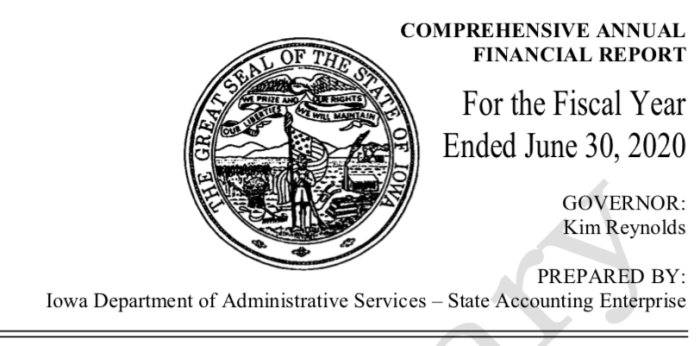The state of Iowa’s Comprehensive Annual Financial Report for the 2020 fiscal year may be finalized by the end of June, six months later than the usual publication date.
Staff at the Iowa Department of Administrative Services compile the report using data provided by state government entities, and for many years have completed that work by December 31. However, Iowa State University (ISU) struggled to provide accurate, auditable data for the fiscal year that ran from July 2019 through June 2020. The reporting problems coincided with the year the university switched to the Workday computer system for accounting.
While other state government units sent their year-end financials by the usual deadline of October 1, 2020, ISU completed that process more than six months later, in early April.
DAS staff have prepared a “preliminary” version of the annual financial report, which the State Treasurer’s Office posted on the Electronic Municipal Market Access (EMMA) website on April 27. A disclaimer on the document’s cover page warns, “The information presented within this report has not been reviewed or audited and is subject to change if any discrepancies are identified during the review and audit process.” The EMMA website is the leading source of information on municipal bonds. Iowa would normally publish its annual financial report there by late January.
Karen Austin, chief of staff for State Treasurer Michael Fitzgerald, told Bleeding Heartland she couldn’t say when the final report would be available, since the treasurer’s office is not involved in producing it.
Sonya Heitshusen, public information officer for the State Auditor’s office, explained via email on April 27 that putting a preliminary annual report online “is not typical practice,” because Iowa has always had the final report ready well before EMMA’s deadline. “However, posting draft information on EMMA until final information is available is not unusual for many governments.”
Historically, the auditor’s office “is the only state department to receive a draft” version of the annual report, Heitshusen said. “The initial draft typically goes through several changes. We just received a draft this morning, so we anticipate there will be changes. We cannot predict what those changes will be.”
What are the next steps in the process? The Generally Accepted Accounting Principles team at the Department of Administrative Services “play a role in checking that the numbers and disclosures tie to supporting documentation provided by each state agency,” Heitshusen said. “However, for a preliminary report to become final, our office must complete our audit work and provide our opinion” on whether the information in the report “is materially fairly stated.”
Heitshusen said auditors are working with the goal of allowing the state to issue a final report by June 30.
The delayed report is unlikely to affect the state’s credit rating or that of ISU. But it could be a warning sign of larger reporting problems to come. Iowa is under contract to start using Workday’s financial software systems across state government during the summer of 2022.
ISU invested in training staff on the switch from cash-based to accrual accounting and how to process transactions through Workday. (Both transitions occurred on July 1, 2019.) Nevertheless, it took months and the collective efforts of many people to transmit fiscal year 2020 data to the state. ISU submitted “incomplete and very draft financial statements in February,” more than four months after the university would normally have sent complete, auditable data to the Department of Administrative Services.
Editor’s note: Bleeding Heartland’s past coverage of this issue used a common acronym for the Comprehensive Annual Financial Report. The Governmental Accounting Standards Board and the Government Finance Officers Association now discourage use of that shorthand reference, because when pronounced it sounds like a racial slur.

